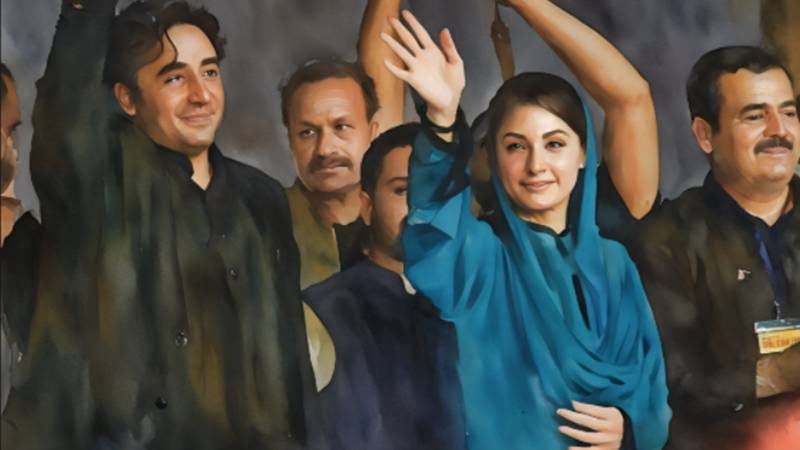
During the 23rd Shanghai Cooperation Organisation (SCO) summit, the use of Rs 2.7 billion for beautifying Islamabad has raised serious concerns about fiscal responsibility and the government’s spending priorities in Pakistan. This extravagant expenditure is particularly troubling given the country's ongoing economic challenges and mounting circular debt.
The government's decision to allocate such a substantial sum for temporary beautification is questionable, especially when Pakistan faces more pressing economic issues. The Economic Coordination Committee (ECC) has rightfully ordered a third-party audit of the claimed expenses, indicating skepticism about the justification for such high costs.The ECC also reportedly did not allow Rs 632m supplementary grants demanded by the information ministry for so-called 'crucial digital initiatives' and outstanding dues spent on the SCO Summit and asked to reappropriate its budget allocations and then come back for any shortfall later. A similar directive was given to the interior ministry, which sought a Rs 550.35m supplementary grant for repairing security cameras for the SCO event.
Islamabad, being the capital city, should be routinely maintained and beautified rather than opting for event-oriented makeup that costs billions of rupees. Were the security cameras dysfunctional, warranting a Rs 650.35m supplementary grant demanded by the interior ministry, followed by Rs 632m by the information ministry?
Spending Rs 2.7 billion on cosmetic improvements for a short-term event reflects misplaced priorities.
The key concerns that arise from this are:
1) economic strain: Pakistan's circular debt and financial challenges make such lavish spending on non-essential beautification difficult to justify
2) routine maintenance neglected: the need for extensive beautification suggests a lack of regular upkeep of the capital
3) questionable necessity: the rationale behind such extensive "beauty parlouring" for a summit is debatable.
The ongoing economic crisis is likely a result of imprudent economic policies prioritised by policymakers. Recent examples include steamrolled bills through parliament, such as changes to the SC Practice and Procedures Act and increasing the strength of Islamabad High Court (IHC) and the Supreme Court (SC) judges from 9 to 12 and 17 to 34, respectively. The reason for increasing the said strength offered by the Shehbaz Sharif-led government was the pendency in the courts. The logic offered is unconvincing. This is because bad governance accumulates backlogs in courts, and institutions have failed to ensure professionalism and resolve issues. As a result, we see people reaching out to court for the redressal of simple issues such as departmental promotion, pending pension, salary issuance, petty matters pertaining property and criminal justice, etc. Besides, politically motivated cases and witch-hunting add to already choked courts. During the Second World War, a popular narrative runs, Winston Churchill, prime minister of the United Kingdom, was being briefed on the death, destruction and economic collapse. Churchill asked, “Are the courts functioning?” Churchill was told that the “judges were present in the courts and dispensing justice.” Churchill replied, “Thank God. If the courts are working, nothing can go wrong.”
Pakistan’s ruling elites are often surrounded by sycophants and oppotunists, limiting their ability to govern effectively
Working courts ie those doing justice without fear or favour, are key to solving problems faced by any country under any circumstances. For a sustainable national development project, Pakistan needs a judiciary that is free from judicial overreach and executive interference. The problem with political parties is that they are anti-status quo when thrown out of office, and once they get into power, they become pro-status quo. They will continue to fall into the same trap until lessons are learned and subsequent course-correction is put in place as a political strategy and stoppng political victimisation of one another. For the sustainable national development project, Pakistan needs a judiciary that is free from both judicial overreach and executive interference.The ruling elites have lost touch with ground realities, undermining institutional capacity. Increasing judges' strength will have significant economic costs to be borne out by the national economy that is teetering on multiple crises as well as facing debt trap.
Experts consider climate change the greatest obstacle to sustainable development. Despite this, there is no priority list for mitigating strategies on this front.
On the heels of smog in Punjab, UNICEF warned that over 11 million children under five are exposed to smog in Punjab's worst-affected districts. It is to be noted that some emergency was enforced, with Lahore and Multan was placed under complete lockdown – not to mention the imposition of a ban on construction work.It has to be remembered that schools, in a bid to lower children’s exposure to pollution, were closed across the province. The smog has caused a heath crisis. Imagine the economic losses emanating from the health crisis and lockdown, which must be borne by individuals and business enterprises respectively. The recently released report by the Asian Development Bank (ADP) revealed that climate change could reduce the GDP in developing Asian and Pacific countries by 17% by 2027 under a high emission scenario. It concluded that without urgent climate action, the impact of climate chage could drastically reshape the future of Asia and the Pacific, with the regions poorest to be the hardest hit.
In Pakistan, thinking about climate change and accompanying challenges illustrates most starkly our leadership deficit. How will the current crop of leaders even begin to address problems of such scope and scale?
Pakistan needs concrete action, not political clamour, to address climate change. Machiavelli, an influential Renaissance political philosopher, emphasised the importance of a ruler's inner circle in determining success or failure. Surrounding oneself with intelligent advisors demonstrates wisdom and the ability to recognise talent. Pakistan’s ruling elites are often surrounded by sycophants and oppotunists, limiting their ability to govern effectively.
To move forward, Pakistan's government should prioritise sustainable development and routine maintenance over costly, short-term beautification projects, especially given the country's economic challenges. Pakistan needs visionary leadership that can ensure a prudent economic framework and a pro-people political system.

